ELECTRICITY SAFETY

Electrical shock and fire are the major hazards that we know of and that are generally associated with electricity.
The effect of electrical shock may vary from minor burns to life ending cardiac arrests.
Proper safety measures as a result of electrical safety awareness is a must for you and your family to live in this world which is filled with appliances, gadgets, tools, equipments, machinery etc – all of which operate on electricity.
Fortunately, these hazards can be eliminated or reduced by staying aware and taking steps to eliminate their dangers, ideally with the assistance of an electrician. These are eight of the most dangerous electrical hazards that could arise in any home.

POOR WIRING AND DEFECTIVE ELECTRIC WIRES
Good quality wiring that conforms to safety standards is vital for safety. Poor wiring can increase chance of fire, power surges, arc faults, and other serious consequences. For this reason, it’s always best to avoid a do-it-yourself electrical work and please get professional electricians to perform electrical wiring.
Damaged, worn, cracked or corroded electrical wires can increase the chance of electrical accidents. Have a qualified electrician check your wiring on a regular basis to ensure wiring is safe. If you need to, upgrade and replace old and faulty wires.
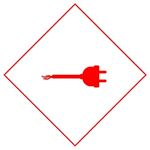
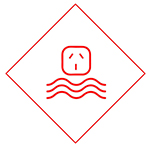
Similarly, electrical appliances should never be handled with wet hands as this heightens the chance of getting an electric shock. Yet too many of us tend to reach for the hair dryer with wet hands out of the shower. Keep appliances far away from sinks, bathtubs, showers, and taps..

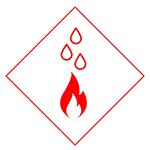
A common error is pouring water on electrical fires. If an electrical fire does occur, avoid pouring water on the flames as water will further fuel the fire and could cause electrocution. Keep a fire extinguisher on site if you’re worried about electrical fires and use that instead of water in times of emergency. If you don’t have one nearby, turn off your electrical power, evacuate your home and call the fire brigade.
Young babies and toddlers tend to be extremely inquisitive and keen to explore their world. While it’s always best to supervise children of this age all the time, parents and adults expecting children at their house can take extra measures to protect young children.
Any electrical outlet at their height and within their reach can be replaced with EXTRA-SAFE power-points. These can be interchanged with a normal power point and prevent sharp objects and fingers from going into the socket. Unprotected sockets can lead to serious injury.
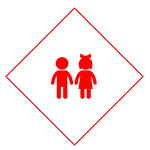

Extension cords should be carefully fixed in place where possible to reduce the chance of tripping or accident. Use plastic socket closures on unused sockets. Don’t use extension cords as a permanent substitute for additional power sockets, and avoid using them for too many appliances at once.
We don’t often think of light bulb’s as being electrical hazardous, but the potential for an electrical fire arises when light bulbs are kept near flammable materials. These can include beds, drapes, plastics, or other items such as upholstery.
Lights, like all sources of electricity, can also cause electric shock, so ensure you always turn the light switch off before replacing a light bulb, and never replace a light bulb or touch a light switch with wet hands. Always ensure you use a light bulb with the correct wattage to prevent overheating.

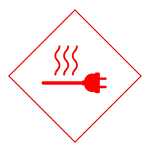
Heavy covering of wires can cause the cords to overheat, which could lead to an electrical fire. Keep cords and wires away from other items and keep them uncovered.
Similarly, make sure that items like computers and televisions have enough space around them for ventilation, to prevent them from overheating.
Educating and making everyone understand the following tips will help keep you and your family and ensure that everybody around you are safe.
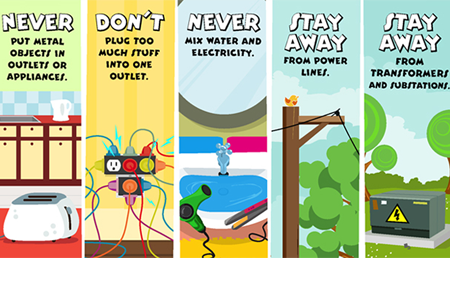
A safe environment also means that it is electrically safe and you must be very cautious and work safely to control and prevent all potential electrical hazards. Following Electrical Safety rules help you control your and others risk of injury or death at workplace from electrical hazards.
If you are working on electrical circuits or with electrical tools and equipment, you need to abide by the following 21 GOLDEN SAFETY RULES:Rule no. 1
Avoid contact with energized electrical circuits.
Rule no. 2
Treat all electrical devices as if they are live or energized.
Rule no. 3
Disconnect the power source before servicing or repairing electrical equipment.
Rule no. 4
Use only tools and equipment with non-conducting handles when working on electrical devices.
Rule no. 5
Never use metallic pencils or rulers, or wear rings or metal watchbands when working with electrical equipment.
Rule no. 6
When it is necessary to handle equipment that is plugged in, be sure hands are dry and, when possible, wear nonconductive gloves, protective clothes and shoes with insulated soles.
Rule no. 7
If it is safe to do so, work with only one hand, keeping the other hand at your side or in your pocket, away from all conductive material. This precaution reduces the likelihood of accidents that result in current passing through the chest cavity.
Rule no. 8
Minimize the use of electrical equipment in cold rooms or other areas where condensation is likely. If equipment must be used in such areas, mount the equipment on a wall or vertical panel.
Rule no. 9
If water or a chemical is spilled onto equipment, shut off power at the main switch or circuit breaker and unplug the equipment.
Rule no. 10
If an individual comes in contact with a live electrical conductor, do not touch the equipment, cord or person. Disconnect the power source from the circuit breaker or pull out the plug using a leather belt.
Rule no. 11
Equipment producing a “tingle” or a mild electric shock, should be disconnected and reported promptly for repair.
Rule no. 12
Do not rely on grounding (earthing) to mask a defective circuit nor attempt to correct a fault by insertion of another fuse or breaker, particularly one of larger capacity.
Rule no. 13
Drain capacitors before working near them and keep the short circuit on the terminals during the work to prevent electrical shock.
Rule no. 14
Never touch another person’s equipment or electrical control devices unless instructed to do so.
Rule no. 15
Enclose all electric contacts and conductors so that no one can accidentally come into contact with them.
Rule no. 16
Never handle electrical equipment when hands, feet, or body are wet or perspiring, or when standing on a wet floor.
Rule no. 17
When it is necessary to touch electrical equipment (for example, when checking for overheated motors), use the back of the hand. Thus, if accidental shock were to cause muscular contraction, you would not “freeze” to the conductor.
Rule no. 18
Do not store highly flammable liquids near an electrical equipment.
Rule no. 19
Be aware that interlocks on equipment disconnect the high voltage source when a cabinet door is open but power for control circuits may remain on. Take care to read the line diagram and wiring schemes.
Rule no. 20
De-energize open experimental circuits and equipment to be left unattended.
Rule no. 21
Do not wear loose clothing or ties near an electrical equipment.
Disclaimer
We have tried our best to provide accurate and easily understandable information for general guidance and tips for electrical safety. We do not claim that the above tips are relevant in all circumstances and also we do not claim that they are exhaustive and we may have left out certain important sections or points. However, take care to kindly refer other sources of information also - if you have any doubts or if you feel that any of the safety tip given herein is irrelevant, inappropriate or inaccurate. Also consult a professional or an expert in electrical safety before you act based on any of the above safety tips. The implementation of safety tips should always be supervised by a sensible person above 18 years of age. Also read relevant manuals and instructions of all appliances, gadgets, equipments etc before using them. To the extent permissible by law, we will not accept or be liable for taking up any responsibility, which will include claims, compensation for any loss, damage or injury caused to your life or property.

Copyright © 2017 VsolV, Rights Reserved.| Privacy Policy | Terms of Use | Designed by HourGlassIT | Web Design Services Chennai